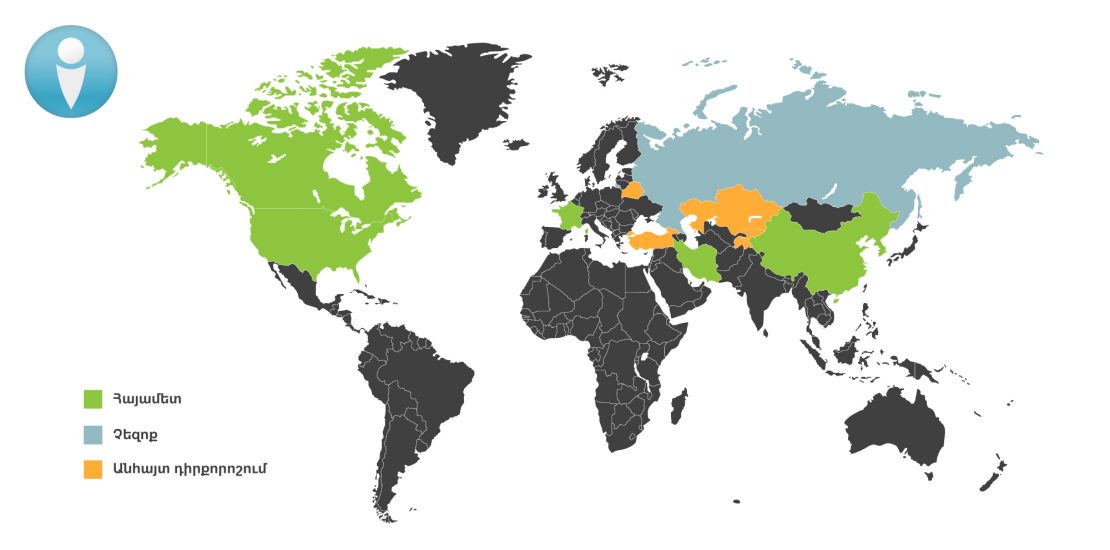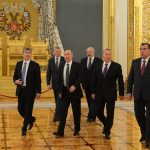- 18 May, 2021
- Foreign Policy

On May 12, units of the Azerbaijani Armed Forces violated the sovereign territory of the Republic of Armenia on the pretext of “border adjustment”, trying to secure positional advances in the south-eastern (in the direction of Vardenis) and southern (in the direction of Sisian) border sections. In order to “avoid unpredictable developments”, the Armed Forces of Armenia responded with demanding that the Azerbaijani side withdraw from the territory immediately and return to their original positions.
On the same day, an extraordinary session of the Security Council chaired by Acting Prime Minister Nikol Pashinyan was held. During the session, the latter stated that what had happened was “a sabotage by nature”, which is “unacceptable”, but “given the situation, the primary plan is to resolve the issue through negotiations, and also by diplomatic means”.
The international community also responded to Azerbaijan’s encroachment on the state borders of the Republic of Armenia. Below we will present the official positions of international organizations and individual countries on the border situation between Armenia and Azerbaijan.
CSTO member states have failed to condemn the incursion
The CSTO, a security alliance, of which Armenia is a member, responded to the incident on May 13, noting that the organization “closely follows the development of the situation in the border regions of Armenia’s Syunik Province“ and at the same time expressed readiness to undertake actions envisaged by the CSTO Charter.
It is noteworthy that the official statement does not present the provocation of the Azerbaijani units against the state borders of Armenia as a reality. Instead it is emphasized that “according to the Armenian side” the Azeris violated the border of the Republic of Armenia.
At the Security Council meeting held on the same day, Armenia formally applied to the CSTO for the first time to launch consultations under Article 2 of the Charter of the Organization, in particular, to take measures to coordinate the positions of the CSTO member states and to eliminate the threat.
The Russian Federation, a CSTO member state and a strategic ally of the Republic of Armenia, has not expressed any official position on the incident for five days already. Instead, there were telephone conversations with the country’s top leadership, which also did not outline the position of official Moscow. It is noteworthy that the telephone conversation between Russian President Vladimir Putin and Pashinyan on border incidents was initiated by the Armenian side, and in the official statement issued by the Kremlin, there is no mention of border incidents between Armenia and Azerbaijan, unlike the statement on the official website of the Prime Minister of Armenia.
On May 17, Russian Foreign Minister Sergey Lavrov stated that he sees “no reason to exaggerate emotions.”
“There is no reason to exaggerate emotions over the situation on the Armenian-Azerbaijani border. No shots were fired, there was no shooting,” he said.
And Putin’s spokesperson Dmitry Peskov did not even know how the Russian president reacted or whether he would respond to Pashinyan’s request for military assistance to Armenia.
The official positions of CSTO members Belarus, Kazakhstan, Kyrgyzstan and Tajikistan are also unknown, despite telephone conversations between high-ranking officials of Armenia and these countries.
In fact, no CSTO member state has condemned Azerbaijan’s encroachment on the territory of Armenia, which is a member state of the same military alliance.
Neighboring countries
Among the countries of the region, official Tehran has responded to the Armenian-Azerbaijani border incident. The Foreign Ministry Spokesperson Saeed Khatibzadeh noted that they are following the developments and expressed hope that the parties will resolve the dispute peacefully. Later, according to the Iranian service of Sputnik news agency, Mojtaba Zolnuri, Chairman of the National Security and Foreign Policy Committee of the Parliament, stressed that any territorial change in the region is unacceptable for the Islamic Republic of Iran.
“If they want to take a part of the territory of Armenia, and our borders are changed, that is, if we have a new neighbor, that will not be acceptable for us. The existing borders must be fully protected, and the common border of the Islamic Republic of Iran with Armenia must be kept,” Zolnuri said.
There is no official response from Georgia, whose Prime Minister Irakli Garibashvili was on an official visit to Armenia the other day. Official Ankara is also silent. Note that Foreign Minister of Turkey Mevlut Cavusoglu recently assured that they do not “have an eye” on the territories of Armenia.
The US, Canada, France
France has defended the territorial integrity of Armenia at the highest level. On his Facebook page, President Emmanuel Macron demanded that Azerbaijan withdraw from the sovereign territory of Armenia.
“Azerbaijani armed forces have made an incursion into Armenian territory. They must withdraw immediately. I say to the Armenian people once again that France is in solidarity with them and will remain so,” Macron wrote.
During a telephone conversation with Pashinyan, as reported by the official statement of the Élysée Palace, Macron suggested moving the issue of the Armenian-Azerbaijani border tension to the UN Security Council. However, the official website of the Prime Minister of the Republic of Armenia has remained silent on the issue. Later, it became clear from Pashinyan’s speech in the National Assembly that the President of France has also expressed readiness to provide military assistance to Armenia under the UN mandate, if necessary.
Spokesperson for the US Department of State Ned Price commented on the recent events in Syunik on his official Twitter microblog on May 13, noting that they are “closely following” reports of rising tensions along the “non-demarcated section” of the Armenia-Azerbaijan border.
It is noteworthy that Price states in his post that the tension is in the non-demarcated section of the border, while evidence shows that the Azeris have made a few kilometers deep incursion into the internationally recognized borders of Armenia.
Later, another official of the Department of State, Jalina Porter, referred to the situation, saying that Azerbaijan should immediately withdraw its troops from “disputed territories“. The Armenian Factor TV media outlet has sent an inquiry to the US Department of State, requesting clarification on whether the term “disputed territories” means that the US has questioned the territorial integrity of Armenia, and whether after the incursion of the Azerbaijani armed forces into the UN-recognized border territories of the Republic of Armenia, the United States considers them disputed territories between the two sides.
In response, the Department of State said it was “seeking further clarification” on the movement of Azerbaijani border guards in the area where “there is no international demarcation of the border,” and urged the parties to hold formal discussions to demarcate the international border peacefully․
Following these statements, Spokesperson for the Foreign Ministry of the Republic of Armenia Anna Naghdalyan once again emphasized that the Azerbaijani side has made an incursion into the sovereign territory of Armenia.
On May 17, the American side clarified its position. During a telephone conversation with Pashinyan initiated by Jake Sullivan, National Security Adviser to the US President, the latter stressed that the American side “considers the actions of Azerbaijani forces inside Armenia’s state borders unacceptable and provocative”. Sullivan also informed that the US position will be presented to the Azerbaijani leadership with a demand to withdraw its forces from the territory of Armenia.
After the telephone conversation with the Armenian leader, Sullivan also contacted Azerbaijani President Ilham Aliyev, describing the movements of troops along the non-demarcated border as “provocative and irresponsible.”
On his Twitter microblog, Foreign Minister of Canada Mark Garneau expressed concern about rising tensions between Armenia and Azerbaijan, as well as “reports of an incursion into Armenian territory.”
Updated on 19․05․2021
On May 19, the Ministry of Foreign Affairs of India called on the “violating party” (Azerbaijan – Ed.) to withdraw its troops and not resort to further provocations.
International organizations
The OSCE was the first international organization to react․ Foreign Minister of Sweden Anne Linden (Sweden is OSCE Chair for 2021) has stated in her Twitter microblog that the OSCE is “following” the situation on the Armenian-Azerbaijani border.
The European Union is also “closely following ” the developments. Josep Borrell, High Representative of the European Union for Foreign Affairs and Security Policy, has stated that border demarcation must be resolved through negotiations “for the benefit of the security of local populations“, and that they welcome “ongoing contacts at the technical level” between the two sides.
Nane Manasyan
Union of Informed Citizens




